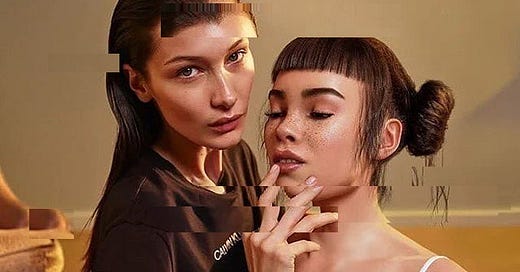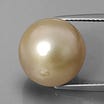As well as being a gorgeously talented writer, Ester Freider is one of the sharpest voices in topics close to my heart… algorithm, persona, cyber aesthetics, and embodiment.
Creator of Wet Love Zine and Everyone Is A Girl, she’s a fearless explorer of online femininity in all its dirt and glory.
Having followed her work for years, I’m thrilled to feature her writing here. I think you’ll love her.
— ULTRA
“The exhausting proprietorship of bodies.”
– Tiqqun, Raw Materials for Theory of the Young-Girl (1999), p. 12
𝐋𝐞𝐭’𝐬 𝐜𝐮𝐭 𝐬𝐭𝐫𝐚𝐢𝐠𝐡𝐭 𝐭𝐨 𝐭𝐡𝐞 𝐣𝐮𝐠𝐮𝐥𝐚𝐫: 𝐭𝐡𝐞 𝐩𝐮𝐛𝐥𝐢𝐜’𝐬 𝐢𝐝𝐞𝐚 𝐨𝐟 𝐚𝐞𝐬𝐭𝐡𝐞𝐭𝐢𝐜 𝐩𝐞𝐫𝐟𝐞𝐜𝐭𝐢𝐨𝐧, 𝐨𝐫 𝐫𝐚𝐭𝐡𝐞𝐫 𝐨𝐧𝐞’𝐬 𝐩𝐫𝐨𝐱𝐢𝐦𝐢𝐭𝐲 𝐭𝐨 𝐢𝐭, 𝐢𝐬 𝐪𝐮𝐚𝐧𝐭𝐢𝐟𝐢𝐚𝐛𝐥𝐞.
You can, with enough data, generate the most perfect face: the face that would be considered attractive to the most amount of people. Perfection, as opposed to artistry or intelligence, has always been in the service of the masses. It’s not about exceptionality. It’s about flawlessness. It doesn’t matter if you add: just don’t detract.
I grew up taking drawing classes until the age of 14. I drew apples, vases, glasses, flowers. Figures. The width ratio between the waist and the hips, the length of the torso compared to the legs, the height of the nose bridge, the length of the cupid’s bow, the amount of fat just under the chin and whether it curves back up near the neck or not – I can see these things quite quantifiably, just because that’s how my intuition has been trained as a child. It also means that for ten years, I looked at the world with a rigor towards appearances, rather than towards content.
Maybe art shouldn’t be for children.
My body must always be mapped out. My body must have no discrepancies. I want it to work the same every time, like a fridge or maybe a chess set. Ideally, I want my body to get “better”. But every time it gets “worse”, I want to become a cloud: be thought vapor, without a wet mouth or a wrong curve.
I’m the accountant and the accounted for, for free. Well, there’s definitely people profiting from it: namely, the superswarm of emerging brands on my Instagram feed, marshalled by influencers so beautiful they seem to be 4D. “Stop procrastinating buying underwear!” I’m reprimanded by the Tik Tok robot voice in a Reels-form ad, while an immaterial German brunette goddess does a little spin in her sun-lit living room. Bras, jade rollers, hair serums, pink gummies, lip stains, various dubious apps, etcetera. It’s another world, where the actual girls are. That world where everyone’s 5’10, taking selfies from over their heads with a matcha latte in clutch, getting invited to model for Paloma Wool, and just generally frolicking. It’s a world that only partially belongs in physical spaces – mostly, it’s something pasted together, packaged, and sold to me by the sweet and innocent algo.
If I was a boy, the level of surveillance I have towards this body, and the fantasies that accompany my supposed lack, would be obviously classified as incel-ism. However, girlhood leaves this self-voyeurism unmarked - it’s just a canonical practice. And in a generation fed, since primary school, on images approved by the masses, every image of beauty must be accompanied by an audience. I feel as if I need thousands to help me discover the shape of this body. I need these strangers with their prying forefingers, to teach me my body. To complete the surveillance act in a way I, forever knotted with its interior, never can. To tell me, I’m a real girl. I’m a real girl.
But you can’t force the internet to like you (you being, in this case, your physical body). Instead, you have to change yourself, or appear to change. You have to figure out the most casual way to lie. Compute all the angles: where do I look a little bit more like the girl next door?
Sometimes, though, I give up and long for something else. 5 in one, same five shirts, nights at the pub, pool and chess. No thoughts in the shower. No reason to keep a journal or a blog: just the total, animalistic comfort with the self that is my stereotypical vision of boyness. In this world, I am the prying hand, not the girl. I get to sit badly, and arch forward from my lumbar, and press my elbows into my knees. But that’s not a choice I really have: I’m always going to be the prey, not predator. Not necessarily because of a pre-cultural femaleness, don’t be mistaken: but rather from the aesthetic framework I’ve been fed female bodies in since childhood. I’m not the ‘default’ subject, I’m the ‘object’ that has to fight for favor. Or can I go backwards? Can I shut my eyes and forget myself? Or rather, forget how to be outside of myself?
Girlhood has always been self-objectification – anyone who’s read that Margaret Atwood quote can confirm. But now it just happens on a scale so cosmic, and so (hypothetically) calculable, that “cuteness is the new sublime”, as Rafi Abdullah would have it. And it’s not a sublime that you can find in the Alps like the heavy-breath quests that dazzled Shelley and Byron. It’s something that is far more anxious, invisible, and pervasive: an informational sublime. It’s always leaking out at the corner of your eye, but you can never take in the full view. Girlhood is now an ouroboric data science. It’s the attempt to understand what only a computer can understand, and make a look out of it.
In this way, every girl is affected by what Mark Fisher characterised in Capitalist Realism as the fate of the Nietzschean Ubermensch: “to have seen everything, but to be decadently enfeebled by that self-awareness”. Now, there’s not one good bra brand or one best foundation – in a lightspeeded age of bottomless, ad-stacked feeds, you can aspire to flawlessness from a different direction each second. The choice fatigue is accompanied by the elation, like sugar-water, that every human feels when presented with opportunity.
I play dress-up with potential itself. But it doesn’t feel like it’s really like I want an outfit. After all, when I buy things from an advertisement of another girl wearing it – a girl who looks more real than me – I feel betrayed when I don’t end up looking like her. The strangest grief comes when I realize I don’t want any product in particular. I don’t even want any waist measurement or any cheekbones in particular – I just want to be part of the sublimity. It feels unfair to be locked out of the “infinite fun space” that computers have privy to, and the attention they reflect/bestow accordingly on the most mathematically successful girl.
The computers, along with the flowers and apples, have been with me since childhood, too. They’ve watched me choose my idea of goodness. Really, they gave it Godspeed. Like angels, they have the most equitable love.
.
.
.
Ester Freider is the creator of Everyone Is A Girl and a writer, digital curator, and ‘creative academic’ residing at the intersection between philosophy and literary studies.
Go further:






